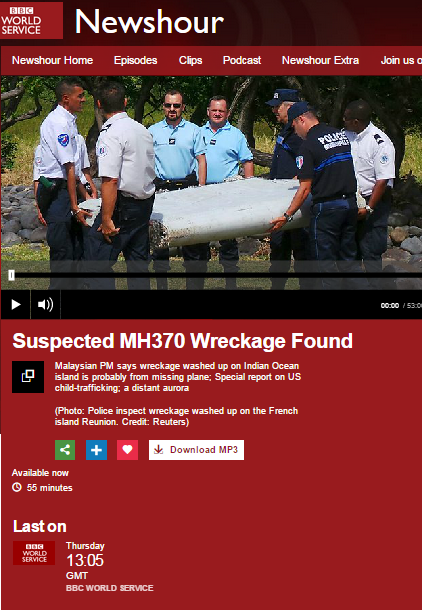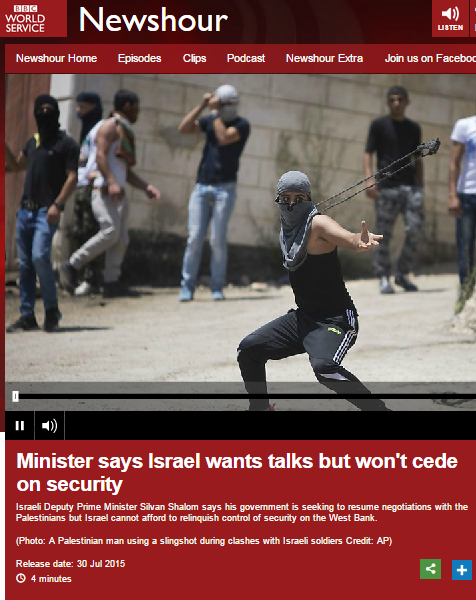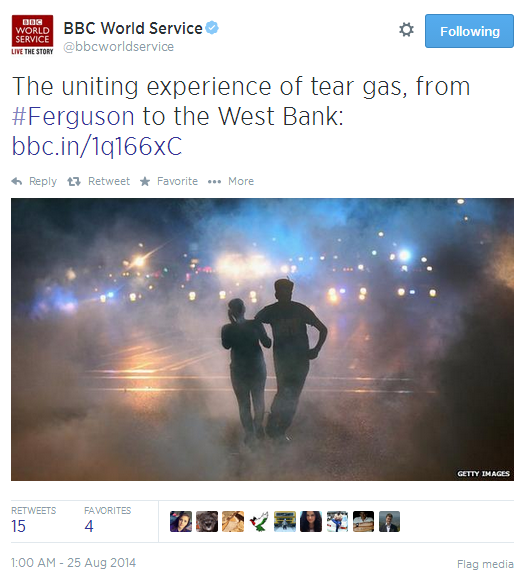A pretty good indicator of whether a BBC interviewer’s questions are intended to promote audience “understanding of international issues” or rather designed to grandstand his or her own political messaging is whether or not audiences actually get the chance to hear the answer to the question posed.
Some examples of the unhelpful ‘deliver long statement-cum-question and then interrupt the response’ technique of interviewing were to be found in the July 30th edition of the BBC World Service radio programme ‘Newshour’ when presenter James Menendez hosted Israeli minister Silvan Shalom.
The interview is available here from 35:39 and a segment of it was promoted separately on social media.
Menendez’s simplistic introduction incorrectly suggested to listeners that Israel is intrinsically opposed to an agreement on Iran’s nuclear programme.
JM: “Is there ever likely to be peace between Israel and the Palestinians? The prevailing view is not anytime soon. Certainly the main broker in all this, the United States, seems to have given up a long time ago. Relations between Israel and the Obama White House are fractious at the best of times and anyway the nuclear deal with Iran became the main foreign policy goal for this administration, further antagonising Israel, which is deeply opposed to the agreement. And yet, in the past few days there has been some movement: reports of talks described as secret between Israel’s deputy prime minister and interior minister, Silvan Shalom, and the Palestinian Authority’s chief negotiator Saeb Erekat. Well Mr Shalom’s in London today and came into the Newshour studio. So what did they talk about?”
Thirty-six seconds into Silvan Shalom’s answer to that question concerning his reported meeting with Saeb Erekat in Amman, a jaded and impatient sounding Menendez interrupts his interviewee.
JM: “And what are you talking about? Does the current government in Israel believe in a two state solution? Can you clear that up? Because the messages have been very confusing over the past few months.”
Shalom manages to speak twenty words before Menendez interrupts him again.
SS: “The prime minister of Israel said after the election very clear that he’s in favour of a two state solution…”
JM: “And is that what you believe as well? There can be a Palestinian state existing alongside an Israeli state?”
Shalom speaks for 28 seconds before Menendez asks:
JM: “What would a Palestinian state look like though? Would it be a Palestinian state with full sovereignty? Because there have been comments from the Prime Minister in the past that Israel would be reluctant to relinquish security control over the areas west of the River Jordan – in other words on the West Bank. Would the Palestinians be left completely alone to run their state as they see fit?”
Shalom outlines the regional threats and precedents for forty-one seconds and then – as he takes a breath – Menendez jumps in:
JM: “That sounds…that you don’t want to grant them full sovereignty. I mean it sounds like already – before the talks have even started – it’s…it’s creating conditions.”
After Shalom’s reply, Menendez raises the following red herring:
JM: “If you’re serious about peace talks why is Israel still building settlements on occupied territory? Just yesterday the US State department criticised the approval of another – 300, I think it was – homes in the West Bank. That doesn’t send the Palestinians any sort of signal that you are serious and sincere about peace talks, does it?”
Listeners are not told that the terms of the Oslo accords do not include any restrictions on Israeli construction. Neither are they reminded that a ten month-long building freeze in 2009/10 failed to bring the Palestinian Authority to the negotiating table or that the complete dismantlement of all communities in the Gaza Strip and four in Samaria a decade ago failed to advance peace. Shalom explains that the said 300 housing units in Beit El were already authorised some years ago and eight seconds later, Menendez interrupts again:
JM: “You can look at the map and you can see settlements that have sprung up over the last few years all over the West Bank. How would a Palestinian state (unintelligible) exist with all those settlements?”
Of course the notion that “settlements” have “sprung up over the last few years all over the West Bank” is inaccurate and misleading. Whilst the number of structures and people living inside the existing municipal boundaries of communities has of course grown, the actual number of authorised towns and villages has not increased in the last decade and a half – as Menendez would clearly have his listeners believe.
Ten seconds into Shalom’s reply to that, Menendez poses another ‘question’.
JM: “But you know the argument, which is that you keep peace talks going for as long as you can, for as many years as you can. You keep building…ah…settlements and you never actually reach any sort of peace deal and meanwhile there is more and more Israeli housing on the West Bank and then a [Palestinian] state becomes simply impossible. In other words you’re just stalling and actually this talk about peace negotiations is just a fig leaf.”
Six seconds into Shalom’s reply Menendez interrupts again – not even allowing his listeners to hear the response to his previous allegations before changing the subject.
JM: “Can I just ask you one question on the vote in the Knesset to allow the force feeding of prisoners who may go on hunger strike. Doctors in Israel – the Doctors’ Association – calls it inhumane treatment. It is inhumane, isn’t it, to force feed prisoners on hunger strike?”
Menendez’s next question is as follows:
JM: “Do you feel isolated at the moment? On peace talks for example? You have the EU, the UN, the US all pushing for those talks. Ehm…we’ve had the Iran deal. Israel’s opposed to it. I mean you’re completely out of step with the rest of the world, aren’t you, at the moment?”
Seventeen seconds into Shalom’s reply to that, Menendez interrupts again, bringing in an irrelevant argument also seen in previous BBC programmes and reducing the very serious topic of Iran’s nuclear programme to the level of the trite and absurd.
JM: “Yeah but they [Iran] believe that you’ve got nuclear weapons. Indeed most of the rest of the world believes you’ve got nuclear weapons. Israel’s perfectly able to defend itself against a nuclear armed Iran, isn’t it?”
Throughout this entire seven minute segment listeners hoping to hear some new information on international issues from the perspective of a senior Israeli minister actually only heard him speak for just over one minute more than the person supposedly facilitating the conveyance of that information.
Audiences did however hear Menendez’s unrelenting grandstanding of his own political views (which, interestingly, appear to absolve one party to peace negotiations from all agency or responsibility) and his inaccurate promotion of the notion that new Israeli communities have “sprung up…all over the West Bank”. Apparently the BBC also intends its audiences to adopt the belief that Israeli concerns about the terms of the JCPOA deal with Iran are baseless and unjustified.
Once again the BBC’s own political messaging takes priority over its obligation to enhance “audiences’ awareness and understanding of international issues”.



